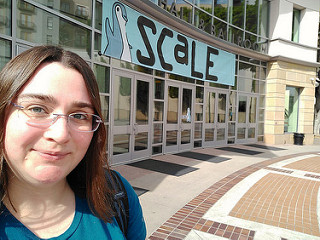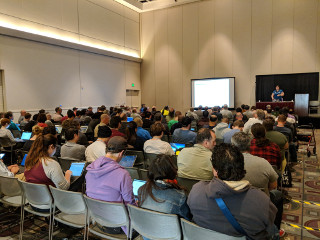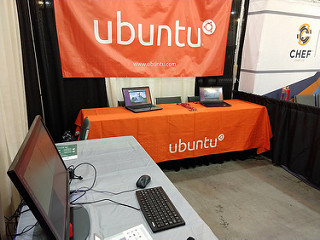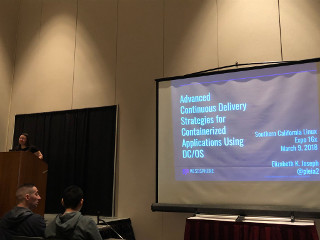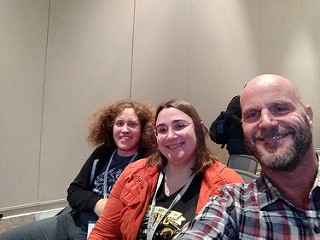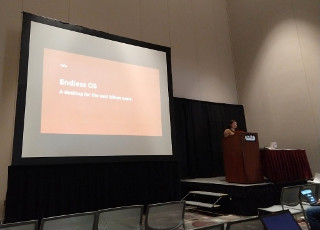Last month I made my way down to Pasadena for one of my favorite conferences of the year, the Southern California Linux Expo. Like most years, I split my time between Ubuntu and stuff I was working on for my day job. This year that meant doing two talks and attending UbuCon on Thursday and half of Friday.
As with past years, UbuCon at SCALE was hosted by Nathan Haines and Richard Gaskin. The schedule this year was very reflective about the history and changes in the project. In a talk from Sriram Ramkrishna of System76 titled “Unity Dumped Us! The Emotional Healing” he talked about the closing of development on the Unity desktop environment. System76 is primarily a desktop company, so the abrupt change of direction from Canonical took some adjusting to and was a little painful. But out of it came their Ubuntu derivative Pop!_OS and a community around it that they’re quite proud of. In the talk “The Changing Face of Ubuntu” Nathan Haines walked through Ubuntu history to demonstrate the changes that have happened within the project over the years, and allow us to look at the changes today with some historical perspective. The Ubuntu project has always been about change. Jono Bacon was in the final talk slot of the event to give a community management talk titled “Ubuntu: Lessons Learned”. Another retrospective, he drew from his experience when he was the Ubuntu Community Manager to share some insight into what worked and what didn’t in the community. Particularly noteworthy for me were his points about community members needing direction more than options (something I’ve also seen in my work, discrete tasks have a higher chance of being taken than broad contribution requests) and the importance of setting expectations for community members. Indeed, I’ve seen that expectations are frequently poorly communicated in communities where there is a company controlling direction of the project. A lot of frustration could be alleviated by being more clear about what is expected from the company and where the community plays a role.
The UbuCon this year wasn’t as big as those in years past, but we did pack the room with nearly 120 people for a few talks, including the one I did on “Keeping Your Ubuntu Systems Secure”. Nathan Haines suggested this topic when I was struggling to come up with a talk idea for the conference. At first I wasn’t sure what I’d say, but as I started taking notes about what I know about Ubuntu both from a systems administration perspective with servers, and as someone who has done a fair amount of user support in the community over the past decade, it turned out that I did have an entire talk worth of advice! None of what I shared was complicated or revolutionary, there was no kernel hardening in my talk or much use of third party security tools. Instead the talk focused on things like keeping your system updated, developing a fundamental understanding of how your system and Debian packages work, and tips around software management. The slides for my presentation are pretty wordy, so you can glean the tips I shared from them: Keeping_Your_Ubuntu_Systems_Secure-UbuConSummit_Scale16x.pdf.
The team running Ubuntu efforts at the conference rounded of SCALE by staffing a booth through the weekend. The Ubuntu booths have certainly evolved over the years, when I ran them it was always a bit cluttered and had quite the grass roots feeling to it (the booth in 2012). The booths the team put together now are simpler and more polished. This is definitely in line with the trend of more polished open source software presence in general, so kudos to the team for making sure our little Ubuntu California crew of volunteers keeps up.
Shifting over to the more work-focused parts of the conference, on Friday I spoke at Container Day, with my talk being the first of the day. The great thing about going first is that I get to complete my talk and relax for the rest of the conference. The less great thing about it is that I get to experience all the A/V gotchas and be awake and ready to give a talk at 9:30AM. Still, I think the pros outweighed the cons and I was able to give a refresh of my “Advanced Continuous Delivery Strategies for Containerized Applications Using DC/OS” talk, which included a new demo that I finished writing the week before. The talk seemed to generate interest that led to good discussions later in the conference, and to my relief the live demo concluded without a problem. Slides from the talk can be found here: Advanced_CD_Using_DCOS-SCALE16x.pdf
Saturday and Sunday brought a duo of keynotes that I wouldn’t have expected at an open source conference five years ago, from Microsoft and Amazon. In both these keynotes the speaker recognized the importance of open source today in the industry, which has fueled the shift in perspective and direction regarding open source for these companies. There’s certainly a celebration to be had around this, when companies are contributing to open source because it makes business sense to do so, we all benefit from the increased opportunities that presents. On the other hand, it has caused disruption in the older open source communities, and some have struggled to continue to find personal value and meaning in this new open source world. I’ve been thinking a lot about this since the conference and have started putting together a talk about it, nicely timed for the 20th anniversary of the “open source” term. I want to explore how veteran contributors stay passionate and engaged, and how we can bring this same feeling to new contributors who came down different paths to join open source communities.
Regular talks began on Saturday with me attending Nathan Handler’s talk on “Terraforming all the things” where he shared some of the work they’ve been doing at Yelp that has resulted in the handling of things like DNS records and CDN configuration being handled by Terraform. From there I went to a talk by Brian Proffitt where he talked about metrics in communities and the Community Health Analytics Open Source Software (CHAOOS) project. I spent much of the rest of the day in the “hallway track” catching up with people, but at the end I popped into a talk by Steve Wong on “Running Containerized Workloads in an on-prem Datacenter” where he discussed the role that bare metal continues to have in the industry, even as many rush to the cloud for a turnkey solution.
It was at this talk where I had the pleasure of meeting one of our newest Account Executives at Mesosphere, Kelly Bond, and also had some time to catch up with my colleague Jörg Schad.
Nuritzi Sanchez presented my favorite talk on Sunday, on Endless OS. They build a Linux distribution using FlatPak and as an organization work on the problem of access to technology in developing nations. I’ve long been concerned about cellphone-only access in these countries. You need a mix of a system that’s tolerant to being offline and that has input devices (like keyboards!) that allow work to be done on them. They’re doing really interesting work on the technical side related to offline content and general architecture around a system that needs to be conscious of offline status, but they’re also developing deployment strategies on the ground in places like Indonesia that will ensure the local community can succeed long term. I have a lot of respect for the people working toward all this, and really want to see this organization succeed.
I’m always grateful to participate in this conference. It’s grown a lot over the years and it certainly has changed, but the autonomy given to the special events like UbuCon allows for a conference that brings together lots of different voices and perspective all in one place. I also have a lot of friends who attend this conference, many of whom span jobs and open source projects I’ve worked on over more than a decade. Building friendships and reconnecting with people is part of what makes the work I do in open source so important to me, and not just a job for me. Thanks to everyone who continues to make this possible year after year in beautiful Pasadena.
More photos from the event here: https://www.flickr.com/photos/pleia2/albums/72157693153653781


